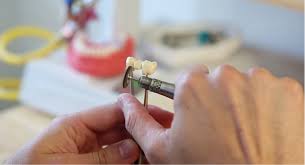If your dentist found damage or decay, you may need a filling or one of several types of crowns. Both help repair teeth but serve different purposes. The right choice depends on how much of your tooth is damaged. Understanding the differences can help you pick the best treatment.
What to Know About Crowns
Crowns cover the whole tooth to restore its shape and strength. Dentists recommend crowns when a tooth is weak, broken, or badly decayed. They can also be used after root canals or for cosmetic reasons. A crown acts like a protective cap.
When Crowns Are the Better Choice
Crowns help when a tooth is cracked or has large decay. They add strength to teeth that can’t hold a filling. Root-canaled teeth usually need crowns for support. They can also improve how your teeth look.
Benefits of Using Crowns
Crowns last longer than fillings, often over a decade. They offer strong support to damaged or weak teeth. Dentists can match them to the color of your other teeth. The process takes longer and costs more than fillings.
Damage Level Matters
Small chips and minor decay usually call for fillings. Large cavities or broken teeth need the strength of crowns. Your dentist will examine the damage closely. They may also take X-rays to check inside the tooth.
Understanding Fillings
Dentists use fillings to treat small or moderate cavities. They remove the decayed area and fill the space with a special material. Common materials include composite resin, porcelain, amalgam, and gold. Fillings work best when enough of the tooth remains.
Benefits of Choosing Fillings
Fillings usually take only one visit to complete. The process is quick and simple. They are also more affordable than other dental options. But fillings may not last as long or work for major damage.
When Fillings Make Sense
Fillings treat minor cracks or cavities. They work well if the tooth still has strong structure. The dentist needs to remove very little natural tooth. This approach helps preserve more of the original tooth.
Tooth Condition Affects the Choice
Weakened teeth benefit more from crowns than fillings. A tooth with a root canal often needs extra support. Crowns help prevent future cracks or breaks. Fillings work best when a tooth is still strong.
Appearance Can Guide the Decision
Front teeth need to look natural and clean. Composite fillings and ceramic crowns both blend well. Crowns offer a more polished look. Your dentist can help pick the right match for your smile.
Think About Longevity
Fillings typically last five to ten years. Crowns often last longer—sometimes fifteen years or more. If you want a long-term solution, a crown may be better. If the issue is minor, a filling might do the job.
Cost May Be a Deciding Factor
Fillings are less expensive than crowns. That makes them a common choice for small repairs. Crowns cost more but offer stronger, longer-lasting protection. Your budget can help guide the choice.
Talk to Your Dentist
Your dentist will explain your options and suggest what’s best. They will check the damage, your bite, and your oral habits. Ask questions and discuss your goals. A clear plan helps avoid more dental work later.
Keep Your Smile Strong
No matter which option you choose, care is key. Brush and floss daily to protect your restoration. Visit your dentist twice a year for checkups. Good habits keep your smile strong and healthy.

